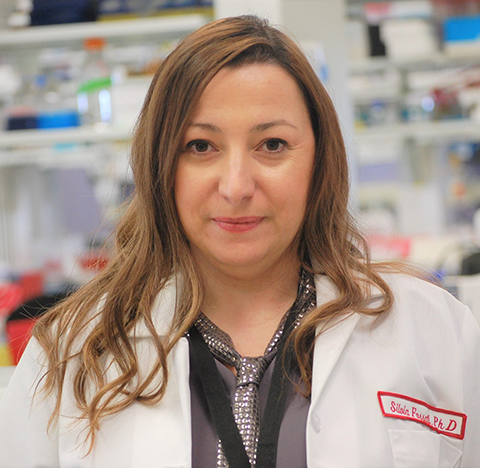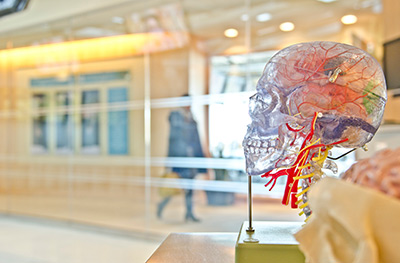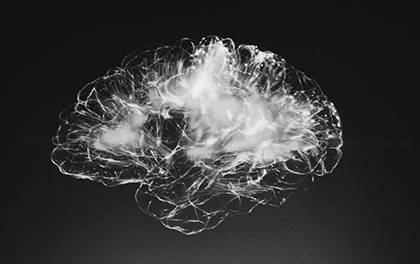Biography
Born and raised in a small town in Tuscany, Italy, Dr. Silvia Fossati describes her childhood as idyllic. From a very young age, she loved discovering new things and experimenting. She knew early on that she wanted to be a scientist who would work on finding a cure for a disease.
She earned an undergraduate degree in molecular biology, then went on to complete her Ph.D. at the University of Florence in pharmacology and toxicology. It was here that she got her first experience studying the brain, a part of the body that had always fascinated her. Her research focused on ischemia, a condition that occurs when part of the body, like the brain or heart, isn’t getting enough blood flow. Through this research, she began to see the connections to neurodegeneration. Looking back, she can see very similar pathways to Alzheimer’s disease, her current research focus.
With encouragement from colleagues, friends, and her mentor, who had recently returned to Italy from a lengthy stint in the United States, Dr. Fossati started looking for positions in the US. She quickly secured a two-year Postdoctoral Fellowship position at NYU, where she focused her work on Alzheimer’s disease, vascular dementia, and amyloidosis. It was here that she earned her first research faculty position. It was also during her time at NYU that Dr. Fossati began receiving the first of her grants, including an Alzheimer’s Association Young Investigator Grant and a Pilot Grant from the NYU Alzheimer’s Center.
Seven years after arriving at NYU, Dr. Fossati became Assistant Professor in the Departments of Neurology and Psychiatry, studying molecular mechanisms and new therapeutic interventions in Alzheimer’s disease and vascular amyloidosis, and collaborating with the Director of the Center of Cognitive Neurology, the Director of the Center for Brain Health, and the Chairman of Psychiatry in biomarker studies. Her work with biomarkers in Alzheimer’s, traumatic brain injuries, and post-traumatic stress disorders provided new insights into the brain and how diseases and injuries progress.

In 2019, Dr. Fossati took a position at Temple University. Her appointment as Associate Professor of Pharmacology and the Associate Director of the Alzheimer's Center coincided with the establishment of a new Alzheimer’s Center at the university. Dr. Fossati had the opportunity to shape the Center and the direction of the research happening there. Today, the work happening at the Center brings together much of Dr. Fossati’s past research tracks — in particular the molecular pathogenesis of disorders of the brain and vascular system and cell-death mechanisms that cause neurodegeneration in Alzheimer’s Disease, cerebral amyloid angiopathy, traumatic brain injury, and post-traumatic stress disorder.
As part of her research, she collaborates with other groups, organizations, and researchers, including the Alzheimer’s disease Research Center and the Cohen Veterans Center, both at NYU.
Research Focus
Overview
Much of the research surrounding Alzheimer’s disease focuses on the neurons. While less well-known among the general population, vascular health and brain health are closely related. The build-up of amyloid proteins in the brain results in disruption of vascular cell function and communication pathways, contributing to cognitive dysfunction often associated with Alzheimer’s disease.

Focus and Priorities
Dr. Fossati’s research focuses on the molecular development of disorders relating to the brain and blood vessels and the cell-death and mitochondrial stress mechanisms that cause neurodegeneration in Alzheimer’s disease, cerebral amyloid angiopathy, traumatic brain injury, and post-traumatic stress disorder.
Dr. Fossati is particularly interested in the vascular dysfunction in the brain that happens with Alzheimer’s. Early on in the disease, the health of the blood vessels is already suffering. As a result, they are one of the first parts of the body attacked by the disease, which accelerates neuronal dysfunction, problems in the elimination of unwanted products from the brain (clearance), and is compounded by other factors like cardiovascular risks.
If a person has cardiovascular risks like hypertension, they already have less blood flow to the brain. That reduced perfusion, combined with a lack of oxygen, nutrients, and blood vessel reaction capacity potentiate the effects of amyloidosis and Alzheimer’s pathology in the induction of neurodegeneration.
Dr. Fossati also collaborates with other investigators in examining the same path to neurodegeneration that can occur with a concussion or traumatic brain injury. Patients with multiple repeated concussions (e.g., professional sports players or veterans), have dysfunctional vascular and clearance systems, making them more prone to neurodegeneration. In a brain that is already subjected to vascular degeneration, Alzheimer's pathology and amyloid precipitates the disease more rapidly.

Potential Benefits
The goal of Dr. Fossati’s work is to unveil new drug development targets that can protect brain neuronal and vascular cells against neurodegeneration, cerebral hypoperfusion, and hemorrhage, and to discover new biomarkers for Alzheimer’s and related neurodegenerative and psychiatric diseases.

Karen Toffler Charitable Trust Investment
The Investment from the Karen Toffler Charitable Trust will enable Dr. Fossati to help young investigators to conduct research that allows them to collect preliminary data on cutting edge projects, for which is otherwise difficult to acquire funding without prior publications. She will use the funding to encourage and motivate students, particularly women and minority students, to feel confident in their innovative research so they can eventually apply for grants of their own.